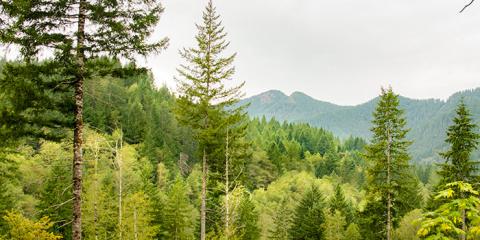Every day is Earth Day in Oregon’s forests
April 26, 2019
I’m writing this blog on Earth Day, and Arbor Day is just a few days away. There’s one big thing I’ve learned in the past nine months, and that’s that Oregon’s forests, and the people who live, work and recreate in them, care about sustainability. The people I’ve met as executive director of the Oregon Forest Resources Institute include professional foresters, natural resource educators, wildlife biologists, conservation groups, hydrologists, loggers, timberland managers, firefighters and recreationists. Suffice to say they come from all walks of life, and from all across the state.
These days it’s pretty hard to find something most people agree about, but when it comes to Oregon forests, there is universal caring and concern for their future. That isn’t to say everyone is in agreement about how to handle the complex issues in forestry. But I’ve found that most Oregonians have a lot more in common than they might think.
One shared value relates to the beauty of Oregon’s forests. Our forests are part of what makes Oregon unique, and everyone wants to preserve the beauty of our landscape so future generations can enjoy and benefit from our forests.
A big threat to the beauty we all enjoy in Oregon’s forests is wildfire. There are no simple solutions to this threat. Sometimes in the face of such complex challenges, people decide they can’t be part of the solution. I find it actually helps to become more involved, so I encourage you to check out these volunteer opportunities in Oregon.
Another shared value relates to the economic benefit forests bring to rural Oregon. Many of Oregon’s rural communities depend on wood that is harvested from local private forests for family-wage jobs in wood products manufacturing. Oregonians from the urban centers around the state also benefit from this wood, through new residential and commercial construction and the jobs they create.
Finally, if you’ve met both a forester and a recreationist, the one thing the two have in common is their love for the outdoors. Foresters manage timberlands with an eye toward the next generation, because a tree that’s planted and cultivated now will grow for decades to come. In much the same way, a recreationist will hike, bike or camp on a particular trail or campsite and clean up as they leave, because they want to return with their children and grandchildren. In both cases, the old saying “Look to leave a place better than you found it” is quite appropriate.
It’s a great sentiment to have as we celebrate Earth Day, and one that foresters, forest managers, landowners and others who help care for forests take with them every day as they work to sustain our forests – for all the benefits they provide – well into the future.
Erin Isselmann
Executive Director
